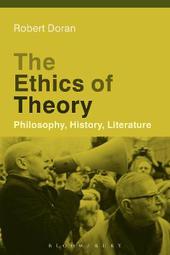
|
The Ethics of Theory: Philosophy, History, Literature
Paperback / softback
Main Details
| Title |
The Ethics of Theory: Philosophy, History, Literature
|
| Authors and Contributors |
By (author) Professor Robert Doran
|
| Physical Properties |
| Format:Paperback / softback | | Pages:240 | | Dimensions(mm): Height 234,Width 156 |
|
| Category/Genre | Literary theory
History of Western philosophy
Ethics and moral philosophy |
|---|
| ISBN/Barcode |
9781474225939
|
| Classifications | Dewey:170 |
|---|
| Audience | | Tertiary Education (US: College) | |
|---|
|
Publishing Details |
| Publisher |
Bloomsbury Publishing PLC
|
| Imprint |
Bloomsbury Academic
|
| Publication Date |
17 November 2016 |
| Publication Country |
United Kingdom
|
Description
In The Ethics of Theory, Robert Doran offers the first broad assessment of the ethical challenges of Critical Theory across the humanities and social sciences, calling into question the sharp dichotomy typically drawn between the theoretical and the ethical, the analytical and the prescriptive. In a series of discrete but interrelated interventions, Doran exposes the ethical underpinnings of theoretical discourses that are often perceived as either oblivious to or highly skeptical of any attempt to define ethics or politics. Doran thus discusses a variety of themes related to the problematic status of ethics or the ethico-political in Theory: the persistence of existentialist ethics in structuralist, poststructuralist, and postcolonial writing; the ethical imperative of the return of the subject (self-creation versus social conformism); the intimate relation between the ethico-political and the aesthetic (including the role of literary history in Erich Auerbach and Edward Said); the political implications of a "philosophy of the present" for Continental thought (including Heidegger's Nazism); the ethical dimension of the debate between history and theory (including Hayden White's idea of the "practical past" and the question of Holocaust representation); the "ethical turn" in Foucault, Derrida, and Rorty; the post-1987 "political turn" in literary and cultural studies (especially as influenced by Said). Drawing from a broad range of Continental philosophers and cultural theorists, including many texts that have only recently become available, Doran charts a new path that recognizes the often complex motivations that underlie the critical impulse, motivations that are not always apparent or avowed.
Author Biography
Robert Doran is Professor of French and Comparative Literature at the University of Rochester, USA. He is the author of The Theory of the Sublime from Longinus to Kant and the editor of The Fiction of Narrative: Essays on History, Literature, and Theory, 1957-2007, by Hayden White, and Mimesis and Theory, Essays on Literature and Criticism, 1953-2005, by Rene Girard.
ReviewsIn this book, Robert Doran shows that the discourses of Theory require a fundamental ethics whose arc connects the subjective to the collective, the textual to the political. In analyses that are clearly written, historically grounded, philosophically astute, and attuned to a literary sensibility, Doran's formidable erudition leads to original transversal syntheses, such as the idea that key thinkers as diverse as Michel Foucault, Claude Levi-Strauss, Jacques Derrida, Rene Girard, Richard Rorty, Hayden White, and Edward Said maintain a dialogue with Jean-Paul Sartre's concepts of choice, freedom, and bad faith. In addition, Doran has the rare distinction of having studied with many of the figures examined in this book, while remaining faithful to their teachings. * Jean-Michel Rabate, Professor of English and Comparative Literature at the University of Pennsylvania, fellow of the American Academy of Arts and Sciences, USA * Robert Doran follows up his stunning history of the idea of the sublime with a complex, perspicuous, and authoritative exposition of the rise (and fall) of "Theory" in Western philosophy, literary studies, and historiography since World War II. Doran not only explicates the ethical considerations of Theory's advent and subsequent transformation; he also offers a model of a new kind of intellectual history, one that treats Theory as a symptom of cultural malaise as well as a resource for overcoming it. * Hayden White, University Professor Emeritus of Historical Studies at the University of California, Santa Cruz, USA *
|